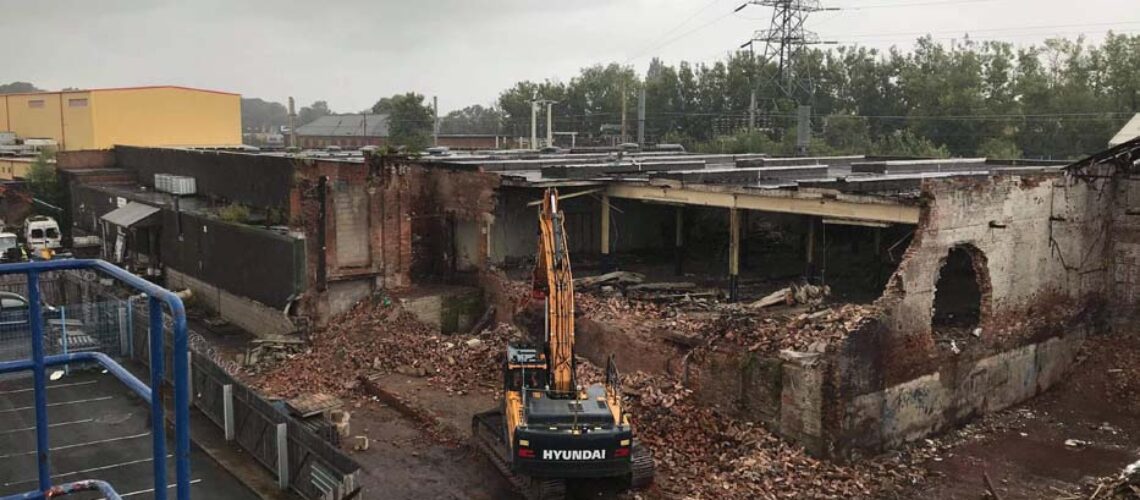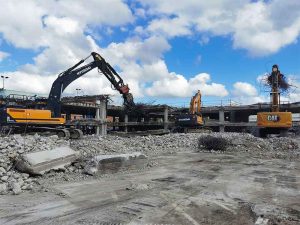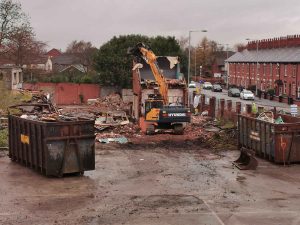Environmental responsibility has taken centre stage in today’s rapidly evolving construction industry.
Demolition, a vital part of the construction process, has yet to be untouched by this trans formative wave. Professional demolition contractors are now known for their expertise in dismantling structures and their commitment to responsible demolition and sustainable practices that reduce the environmental impact of their operations.
In this blog, we will delve into environmental responsibility in demolition, exploring sustainable practices such as recycling and reusing materials, waste reduction, and adherence to stringent environmental regulations. We will also show how a comprehensive fleet of sophisticated machinery contributes to efficiency in these efforts.
Recycling and Reusing Materials
One of the primary ways demolition contractors demonstrate their commitment to environmental responsibility is by adopting recycling and material reuse practices.
During demolition, countless materials like concrete, metal, wood, and even glass are salvaged and recycled, helping reduce the burden on landfills and conserving valuable resources.
By re-purposing materials, professional demolition companies play a pivotal role in the circular economy, where waste is minimised, and resources are conserved for future generations.
Waste Reduction
Waste reduction is a fundamental aspect of environmentally responsible demolition.
Every demolition project generates a significant amount of waste, which, if not handled properly, can have severe environmental consequences. Part of our role as professional demolition contractors is to meticulously plan and execute projects to minimise the waste generated from our projects
By applying selective demolition techniques we can salvage usable materials and responsibly dispose of non-recyclable waste. By doing so, we can contribute to a cleaner environment and reduce the strain on our limited landfill space.
Adherence to Environmental Regulations
Environmental regulations are in place to ensure that demolition projects do not harm the ecosystem. Demolition contractors, being professionals, understand the importance of complying with these regulations.
They obtain the necessary permits, conduct environmental impact assessments, and follow strict guidelines to protect air and water quality, wildlife habitats, and overall ecological health.
This commitment to compliance demonstrates their dedication to minimising the ecological footprint of their work.
The Role of Comprehensive Machinery
Efficiency is a cornerstone of sustainable demolition practices. Utilising a comprehensive fleet of sophisticated machinery expedites the demolition process and minimises disruption to the surrounding environment.
Modern demolition equipment is designed for precision and safety, enabling contractors to dismantle structures with reduced noise, dust, and vibration, helping to minimise disturbances to neighbouring communities and ensuring a safer working environment for demolition crews.
In Conclusion
Environmental responsibility in demolition is not just a buzzword; it’s a fundamental commitment to safeguarding our planet’s future.
Professional demolition contractors play a crucial role in this endeavour by adopting sustainable practices such as recycling, waste reduction, and strict adherence to environmental regulations.
Their use of advanced machinery enhances efficiency and minimises the impact on the ecosystem. As we continue to build and rebuild our world, we must do so with an unwavering focus on environmental responsibility, ensuring a greener and more sustainable future for all.
For your next demolition project, consider partnering with a professional contractor committed to these principles, contributing to a cleaner and more sustainable world.





